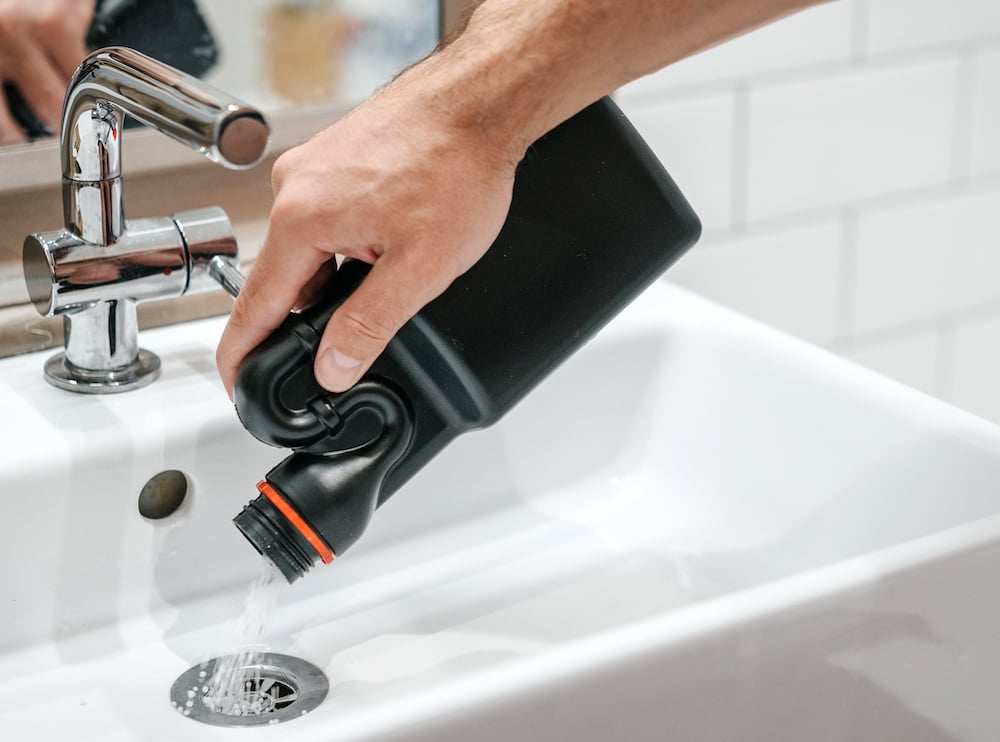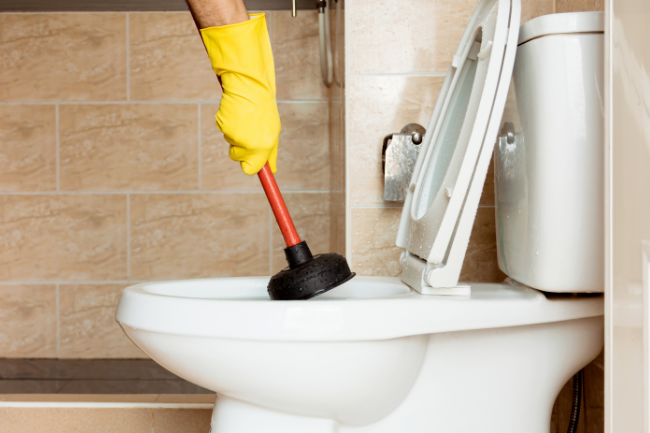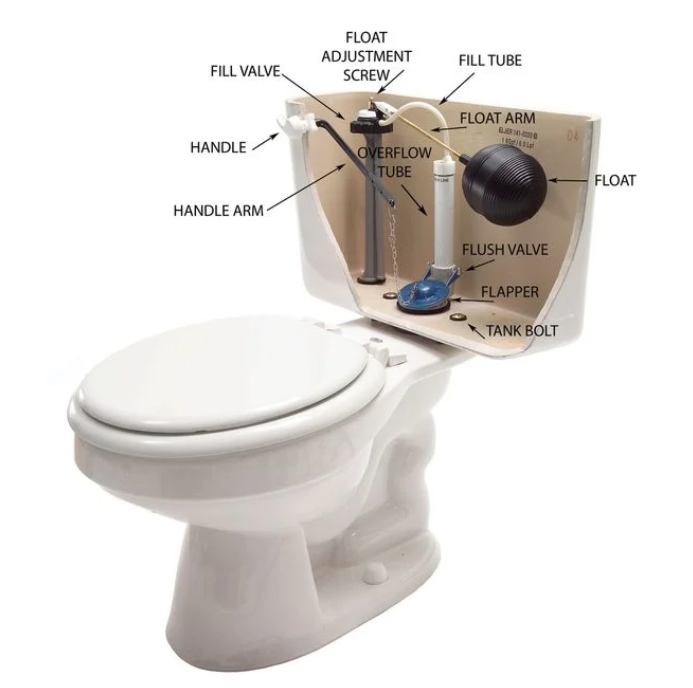How Commercial Drain Cleaners Damage Pipes, Health, and the Environment
Posted by William Heinselman on

When your drain is clogged, it’s not uncommon to reach for the nearest commercial drain cleaner. And for good reason – they work, often quickly clearing stubborn blockages. But, have you ever stopped to think about why they’re so effective? What you don’t know about chemical drain cleaners, their ingredients, and the way they work may surprise you.
Chemical drain cleaners, when used in excess or for regular drain cleaning, can actually make moderate drain issues worse. For products so effective at removing clogs and residue, how is this possible? And, if they can harm your pipes, can they also harm your health or the environment? In this article, we weigh the pros and cons of using commercial drain cleaners and give our final verdict on whether you should use these products or try safer alternatives.
Risks of Commercial Drain Cleaners
How Commercial Drain Cleaners Hurt Your Pipes
Are drain cleaners bad for pipes? We would be lying if we told you that commercial drain cleaning products aren’t good at what they advertise; these products can effectively clear a drain pipe of stubborn clogged debris, and remove gunk and residual buildup better than water pressure alone. This includes everyday clogs caused by:
- Cooking oils or animal fat
- Animal bones or fragments run through drain disposal units
- Starchy or overly-fibrous food products
- Hair or nail clippings
- Plastic or paper products
While drain cleaners may help in the short term, they can hurt in the long term, especially if used frequently. High-strength acidic drain cleaners that contain sulfuric acid can be especially damaging, as the chemical is recognized as dissolving most metals. “But I have plastic pipes,” you might think. Well, those too can be damaged by chemical drain cleaners. The caustic cleaning materials can create a chemical reaction and produce heat, at temperatures that can warp, or even melt, the plastic pipe. It’s these reactions that can actually make plumbing matters worse, and turn an everyday drain issue into a full-blown plumbing disaster.
When used extensively or on a routine basis, chemical drain cleaning products can corrode within pipes and damage inner pipe walls to such an extent that DIY fixes become impossible. Through heavy use of commercial cleaners, you could potentially turn a minor sink clog into a full pipe collapse. Your quick and simple fix would then require hundreds of dollars in repair and renovation costs, if not more!
How Commercial Drain Cleaners Hurt Your Health
Even worse than pipe corrosion and additional renovations, however, would be prolonged exposure to commercial drain cleaners. Ever look at the ingredients contained in some drain cleaners? The list can be downright scary. It is estimated that across America, there are 3,000 injuries related to drain cleaners every year (approximately ⅓ of these involve cutaneous burns caused by sulfuric acid that result in painful skin grafting). In addition, incidents involving household cleaning products accounted for 11% of phone calls made to poison control centers for kids aged 6 and under, says Consumer Reports.
In addition to burns, even just the fumes in many of these products are toxic; although they aren’t technically considered a pollutant, all sorts of dangerous toxins can form (including Mustard gas) when these chemicals come into contact with surface water. And, when you consider that chemical ingredients in liquid drain cleaners are intended to break down organic material (such as sink debris and food products often resulting in clogs), and clear drain passageways of all residual matter, one can only imagine what this would mean for eyes or skin upon contact.
Pro Tip: Even if you decide to use a chemical drain cleaner, never mix different drain cleaners. Mixing drain cleaners that contain bleach with acidic cleaners can cause the production of chlorine gas, a "very noxious gas that can cause respiratory problems. It is very poisonous to breathe in," says Tom Teets, Assistant Professor of Chemistry at the University of Houston.
How Commercial Drain Cleaners Hurt the Environment
Considering what chemical drain cleaners can do to your pipes and your health, it’s not surprising that they can damage our planet. When water and chemicals go down your drain, they’re often headed right out into the natural world. According to Carbon Companion, some chemical solutions are bad for the environment and have adverse long-term side effects, including aquatic toxicity and the destruction of bacteria. Once the chemical cleaners leave your system and enter surrounding waters, they can change PH levels, causing tissue damage to wildlife and death when ingested before dilution. It also affects developmental, endocrine, and reproductive systems.
And if that wasn't enough, the ingredients present in chemical drain cleaners and other household products can release "volatile organic compounds" (also known as VOCs), which can be deeply harmful to air quality. Researchers have found that VOCs released by household cleaning products have become a substantial source of air pollution in urban areas (via The Guardian). All the more reason to go natural.
6 Most Dangerous Chemical Drain Cleaners

There are a few cleaning products that pose a greater hazard to your health, your home, and the environment than their marketing and labels might suggest. Organizations such as the Environmental Working Group (EWG) maintain lists of some of the worst offenders:
1: Drano Professional Strength Kitchen Crystals
Most plumbers will probably tell you to avoid using products like Drano because of the potential damage they could do to your home’s pipes. These chemicals are inherently dangerous, as they’re typically formulated to dissolve organic matter, hair, oil, and other clog materials—contact with flesh usually results in a nasty chemical burn.
What makes Drano’s kitchen crystals product especially worrisome is their tendency to remain in the drain well after use and to react violently with water, causing it to erupt or boil out. The potential danger of water reacting with leftover crystals in the drain was severe enough for the product to make EWG’s “Hall of Shame.”
2: Comet Disinfectant
This staple cleaner has been in American households for a long time. However, tests by EWG showed that Comet powder released chemicals that have been linked to cancer and asthmatic disorders. Some of these chemicals, such as “formaldehyde, benzene, chloroform and toluene – are not listed on the label,” according to EWG research. Plus, the bleach in the powder can cause problems for certain kinds of plumbing pipes.
3: Ajax Liquid Laundry Detergent
Formaldehyde, or formalin, is most commonly known for its use in funeral homes; where it is used to preserve bodies. However, it is also a carcinogen known to cause asthma and allergies in humans. The problem is that Ajax liquid laundry detergent contains formaldehyde. When you wash clothes with this product, some formaldehyde residue might transfer from the clothing to your skin. This can cause irritation and allergic reactions.
4: Bleach
Bleach (sodium hydroxide) is a common household cleaning product and ingredient in many other products. A well-documented irritant, bleach is an alkaline (or base) with a pH over 12. If mixed with acids, a chemical reaction known as neutralization occurs, which has byproducts of water and salt. The problem here is that salt can be highly corrosive to many different pipe materials, causing corrosion.
The use of bleach can be even more problematic for homes that have septic systems, as enough concentrated bleach can upset the pH balance in the tank—killing the bacteria the septic tank relies on to perform its function.
5: Floor Cleaners with Nonylphenol Ethoxylate
Nonylphenol Ethoxylate, commonly found in floor cleaners such as Spic and Span, is a substance that can become toxic as it breaks down. When broken down into nonylphenol, this chemical can harm the human hormone system, and is highly toxic to aquatic life. California already has a ban on the manufacture of products with this chemical compound. So, you probably won’t find it on Sacramento store shelves.
6: Ammonia-Based Cleaners
A common ingredient of many window cleaner products, ammonia is not only a powerful irritant, but it has been linked to “chronic bronchitis and asthma” in studies from ChemConscious, Inc. cited by Experience Life Magazine. If mixed with bleach, ammonia can create poisonous fumes with immediate harmful effects.
Safer, Non-Corrosive Cleaning Alternatives
Dealing with stubborn clogs and backup hassles doesn’t have to be as difficult as you might think. In fact, you may be able to entirely remove debris in your drains using products and non-toxic chemicals already in your home. For combating everyday drain clogs, homeowners can try three effective DIY cleaning solutions, which are:
- Borax. Borax, when mixed with baking soda, can be used as a mildew cleaner in the bathroom. It can also be mixed with mild liquid soap, lemon juice, and warm water to act as a cleaner for carpets and upholstery.
- Acidic soda products. The high carbonation and natural acids in soda products act much like chemical cleaning products to break down clogged debris and can remove residue with zero of the risks associated with commercial products.
- Baking soda and vinegar mixtures. Non-toxic DIY mixtures of vinegar and baking soda react within drain pipes to remove frustrating clogs without putting the condition of your pipes in jeopardy. Here’s how to clear clogs with baking soda and vinegar.
-
- Carefully pour some boiling water down the drain.
- Mix one cup of baking soda with one 1 cup of water/1 cup vinegar solution and pour it into the drain.
- Cover the drain with the drain plug and wait 5-10 minutes.
- Pour boiling water down the drain again. The bubbling reaction from the baking soda and vinegar helps to loosen the drain clog, and the boiling water in step 4 helps remove it from your pipes.
When in Doubt, Call the Professionals at Express Sewer & Drain in Sacramento
So what’s the final verdict on commercial drain cleaners: Is drain cleaner dangerous? While effective at removing clogs and debris, products like these bring other risks, which can put your pipes, health, and the environment in danger. So, although handy in a pinch, you should never use commercial products regularly to maintain your pipes. If possible, try safer alternatives, such as non-toxic mixtures and acidic sodas, or contact an expert. In the Sacramento area? The drain cleaning professionals at Express Sewer & Drain are always here to help with your plumbing needs!






